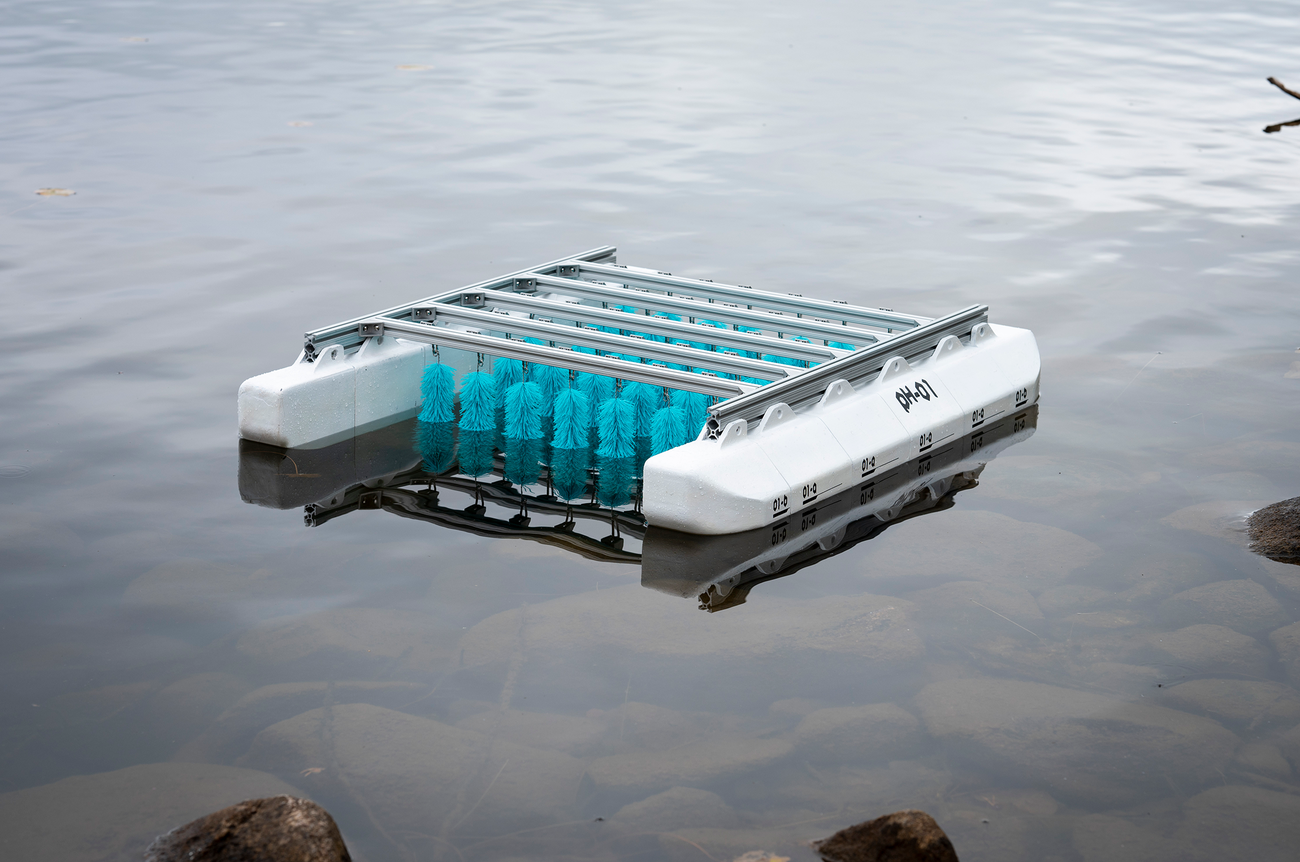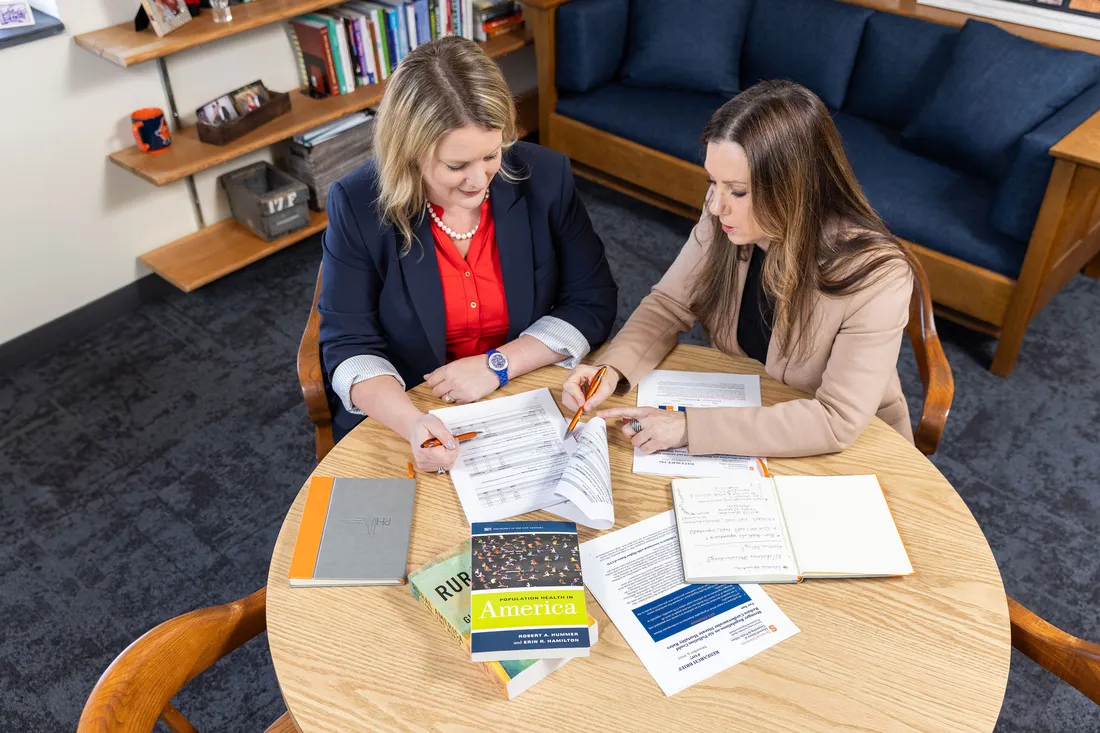As Syracuse University School of Architecture (SOA) undergraduate students, Nathaniel Banks ’18 and Yidian Liu ’18 became successful collaborators, tackling projects together and winning a James Britton Memorial Award in the school’s senior thesis competition. Today, as cofounders of the New Jersey-based startup PolyGone Systems, they’re taking on a major environmental and public health issue: microplastic pollution in the world’s waterways. “Outside of water treatment facilities, there’s currently no system to remove microplastic waste that’s effective, especially with particles below 1 millimeter in size, so that became the challenge,” Banks says. “We wanted to see if we could address this large issue using our design skills.”

School of Architecture alumni Yidian Liu '18 and Nathaniel Banks '18 were honored by Forbes for their innovative work in developing the floating filter system to address microplastic pollution. Photo courtesy of PolyGone Systems.
With their PolyGone team—which includes fellow SOA alumnus Yuntian “Barry” Zhang ’22—the clean-technology entrepreneurs are piloting various microplastic collection systems. The Plastic Hunter is a floating collection station they created that removes microplastics from waterways with an array of proprietary silicone fiber filters (known as Artificial Root Filters) that were inspired by aquatic plant roots. They’re also developing customizable industrial systems for removing microplastics from wastewater and drinking water facilities utilizing large arrays of their Artificial Root Filters. Since microplastics and the filters are both hydrophobic, they are drawn to one another to reduce their contact with water, allowing the filters to capture the particles. This filtration technology has garnered PolyGone more than $2.4 million in funding and earned Banks and Liu a place in the 2024 Forbes’ “30 Under 30” listing for social impact, recognizing their “exceptional contributions and commitment to excellence within the field of sustainable design and water treatment.”

Banks introduces the Plastic Hunter to attendees of the 2023 Global Investment Promotion Conference in Guangzhou, China. Photo courtesy of PolyGone Systems.
Banks and Liu cite their SOA education for providing comprehensive design experience through a combination of traditional and digital design work and for preparing them for graduate studies at the Princeton University School of Architecture, where their idea for the microplastic collection systems took hold. “Syracuse University gave us a complete priming on how to do all aspects of design,” Banks says. “By getting a good mix, you end up with the best of both worlds, and we really like to incorporate that into our team because we designed this work from that training.”
Launching Pilot Projects
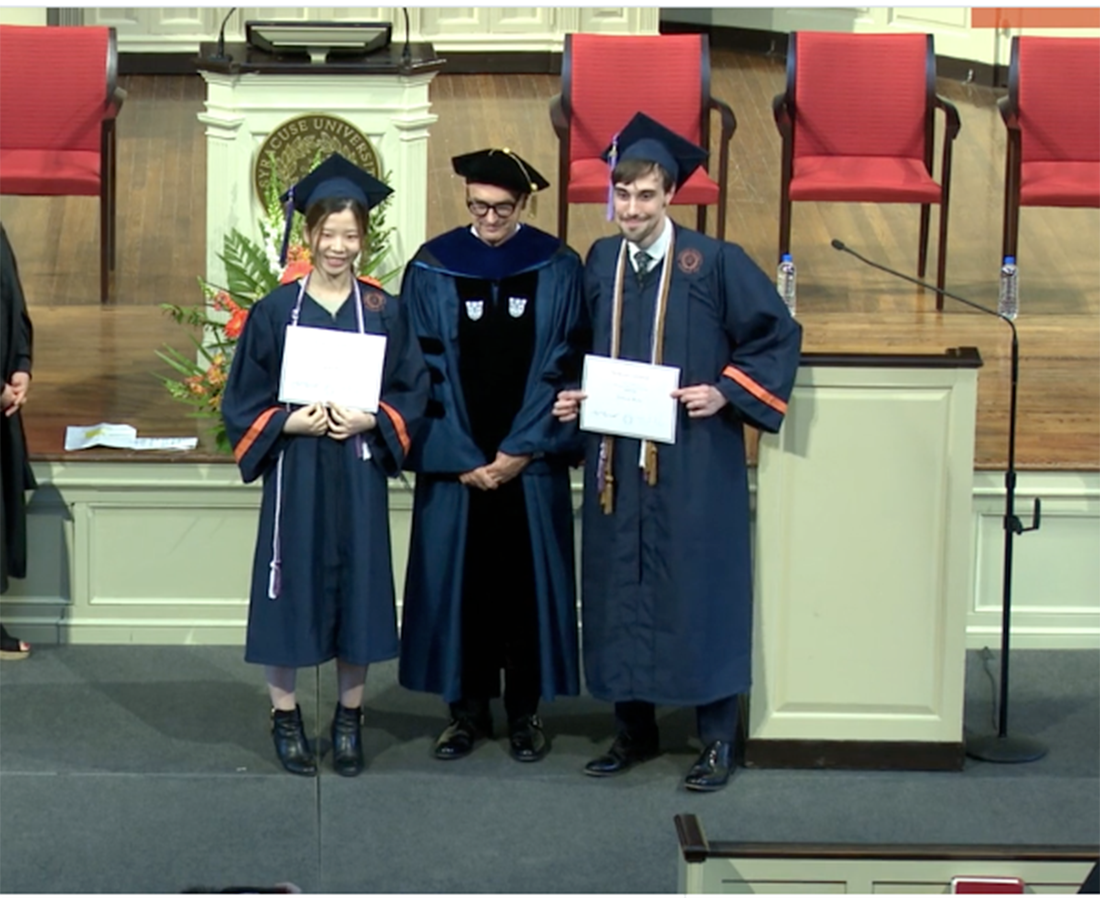
School of Architecture Dean Michael Speaks (center) poses for a photograph with Liu and Banks at the school’s 2018 Convocation ceremony.
They currently have pilot projects underway in tributaries of the Hudson and Delaware river watersheds; a research lake in Ontario, Canada; and at wastewater treatment plants in Richmond, California, and Atlantic City, New Jersey, where they’ll host a grand opening of the project at the Atlantic County Utilities Authority’s Wastewater Treatment Facility on Sept. 12. The project will also feature the Microplastic Educational Pavilion, an exhibition designed to raise public awareness. “Our focus on microplastic pollution is unique, but it’s a niche problem that a lot of people may not even start to worry about,” Liu says. “Given the opportunity to present at conferences, showcase the projects and share the resolutions and data we’ve collected is extremely helpful to start conversations and build a trust.”
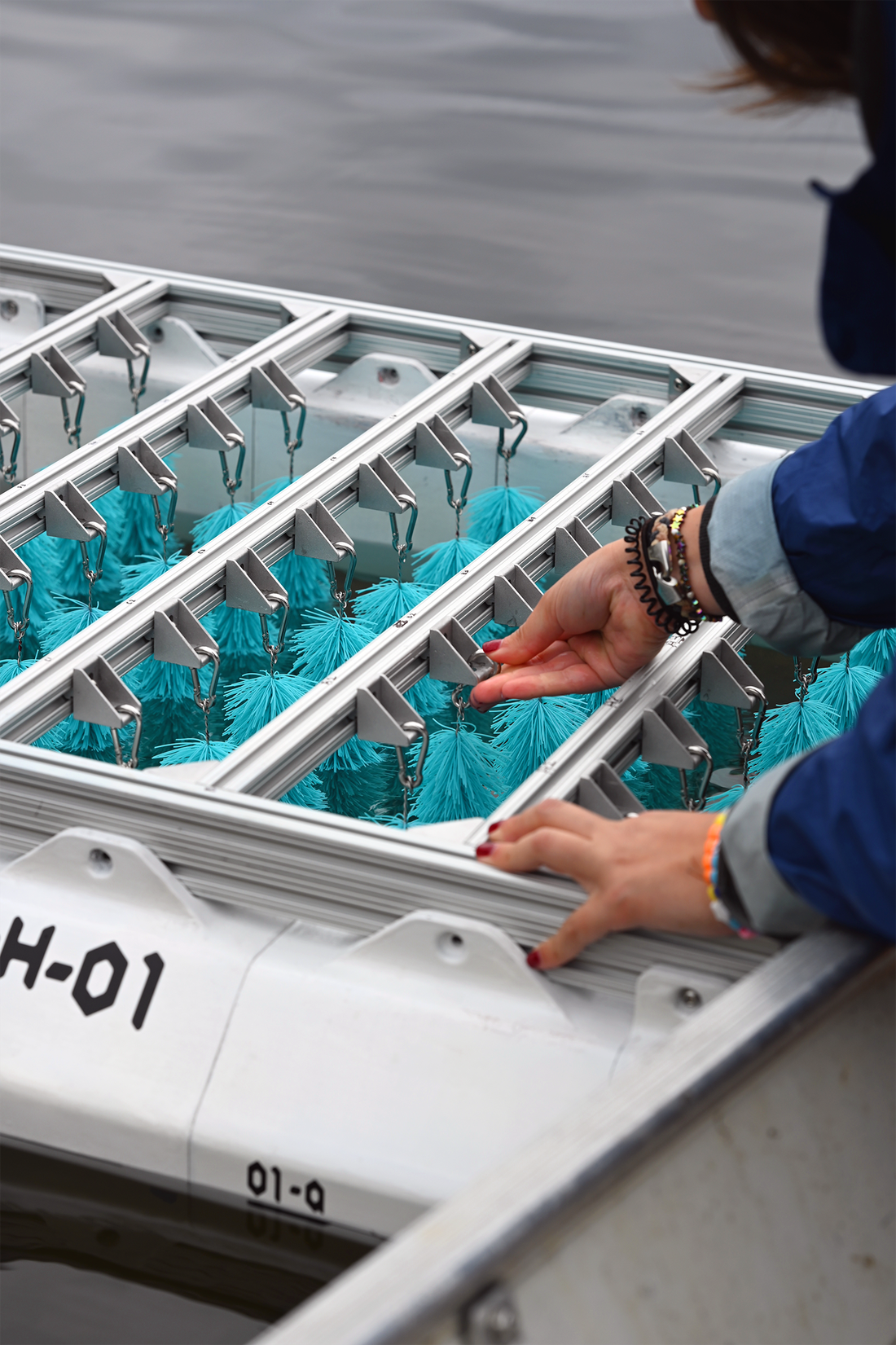
The Plastic Hunter’s silicone fiber filters are modeled after aquatic plant roots and can easily be attached and removed from the collection system. Photo courtesy of PolyGone Systems.
Banks’s and Liu’s interest in collecting microplastic waste evolved out of their joint graduate thesis, Plastic Plastic, which investigated plastic waste contamination of coastal and marine ecosystems and proposed an architectural system for collecting the debris. The issue led them to experiment with coconut fiber to nab the particles and eventually the artificial root of silicone fibers. The work earned them the 2021 Princeton Research Day Presentation Award, which inspired them to establish PolyGone Systems in 2021. “In early 2022, we got our first venture capital investment and that allowed us to pursue the project full time,” Liu says. “Since then, things have just gone up and up and up.”
Staying Connected to Syracuse
Banks and Liu have maintained their relationship with SOA, including Professor Fei Wang, who recommends talent for their team. Last summer, architecture major Linqing “Laurie” Lao ’25 interned as a design assistant. Along with learning about the business and building her design software knowledge, she worked on a digital model of the educational pavilion to create a 3D tabletop model. “Nathaniel and Yidian were very patient with me,” Lao says. “They gave me time to learn and taught me a lot.”
Since joining PolyGone in 2023 as an assistant designer, Zhang has worked on prototypes of the Plastic Hunter and the design of the educational pavilion, which features an enclosed tube containing used silicone filters stained with fluorescence. Visitors will look into the tube through a small telescope and when an ultraviolet light is turned on, it illuminates the captured particles. “It’s like a now-you-see-it-now-you-don’t experience,” Zhang says. “With our design background, we have that special skill set to showcase what we’re doing and connect the general public to our work.”
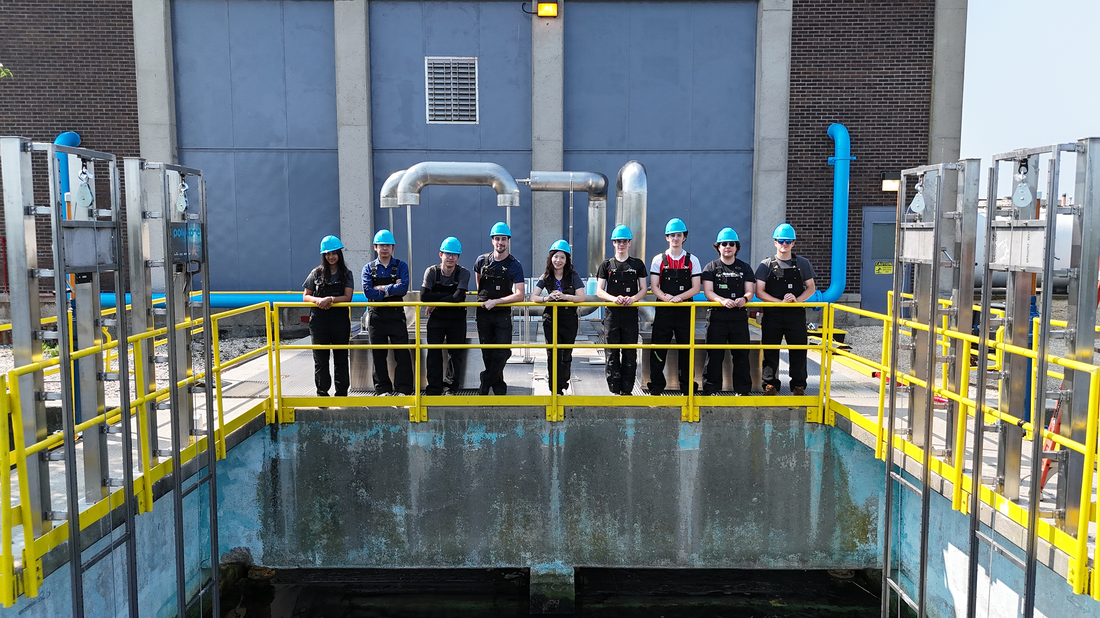
The PolyGone Systems team gathers at the Atlantic County Utilities Authority’s Wastewater Treatment Facility in Atlantic City, New Jersey, where they installed an industrial-scale microplastic collection system. Photo courtesy of PolyGone Systems.
Like many startup entrepreneurs, Banks and Liu continue to seek grant funding and venture capital to build PolyGone and pursue their mission. “One of our goals is to make our systems as flexible and adaptable as possible,” Banks says. Ultimately, they envision their systems being applied to a variety of waterways and wastewater/drinking water treatment plants, delivering an innovative solution to an ever-growing global issue.

